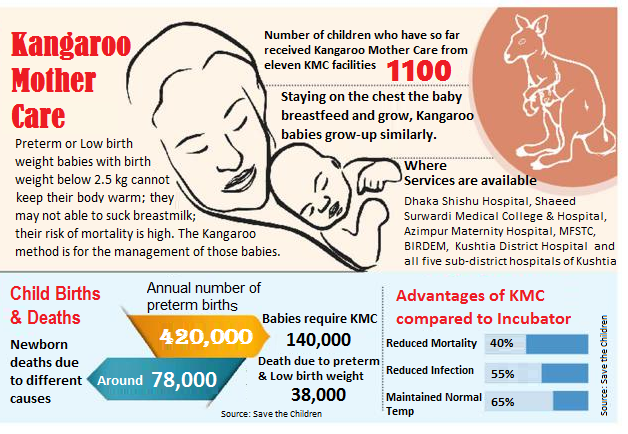![]()
By Shishir Morol and Touhid Hasan
Originally appeared in Protho Alo and reprinted by permission. Translation by Sohrab Hussain.
To ensure her newborn would survive, Sayeda Meherunnessa, a school teacher was admitted to Kumarkhali Sub-District Hospital, Kushtia, on 23 February 2017. After the third day of her stay it was found that the mother kept her baby between her breasts in skin-to-skin contact. She said, “This is the way kangaroo mothers share their body heat with their premature baby. The baby has been gaining weight and feeding properly for the last three days in this position.”
 The nurse on duty said that a room within the hospital has been designated as a “Kangaroo Mother Care” room where preterm and low birth weight babies are provided with special care.
The nurse on duty said that a room within the hospital has been designated as a “Kangaroo Mother Care” room where preterm and low birth weight babies are provided with special care.
Kangaroo Mother Care, or KMC, is a method of newborn care where the baby is kept between the mother’s breasts and constant skin-to-skin contact is maintained. This keeps the baby warm and allows for frequent breastfeeding.
Save the Children, an international NGO working for child survival and wellbeing, is providing the technical assistance to the government for Kangaroo Mother Care. The Program Director of the Saving Newborn Lives program of this organization, Dr. Sayed Rubayet, said, “Since 2016, 262 newborns have received Kangaroo Mother Care from six hospitals of Kushtia district. There were three deaths among them. This intervention is much more effective than the services provided with incubators.”
Jesmine Akhter lives in Lahinipara of Kumarkhali sub-district of Kushtia. In the first year of her marriage, she gave birth to a baby at eight months of pregnancy and the baby died. In the subsequent year she delivered another premature baby, who also died. Four years later, on 3 October 2016, she gave birth to another baby who was again premature and weighed only 1400 grams. The baby received Kangaroo Mother Care at the KMC Unit in Kushtia General Hospital. Receiving KMC for 13 days she was discharged from the hospital when the doctor became confident that the baby was out of danger.
Dr. Mohammad Ayub Ali, Associate Professor, Department of Pediatrics, Kushtia General Hospital, told “Prothom Alo” that “Initially people did not show interest in this special care. Now this care has become popular. Every week, 2 to 3 babies are getting this care from this hospital.”
Eminent Pediatrician and Chairman of Bangladesh Medical and Dental Council Professor Mohammod Shahidullah told “Prothom Alo” that “Premature babies and low birth weight babies are unable to maintain their body temperature. If the baby is placed between the mother’s breasts, it ensures the proper temperature of the baby. This is a natural process which we were not properly informed of earlier that can be used as a suitable medical technique for increasing the survival of premature babies. It is now our responsibility to ensure that all pediatricians in the country are aware of and trained about this.”
Kangaroo Mother Care has been included in government health programs in most African countries, as well as in Philippines and in Malaysia, and though it’s practiced widely in India it is not included in the government’s program. KMC is endorsed by the World Health Organization, which has developed global guidelines on KMC.
In 2007, the International Centre for Diarrheal Disease Research, Bangladesh (icddr,b) first initiated KMC at Matlab Hospital. In the last seven years, 890 premature newborns have received KMC from this center. Globally KMC was first introduced in the 1970s. In Bangladesh, KMC was first introduced at the LAMB hospital, Dinajpur District in the early 1990s. Apart from Matlab Hospital of icddr,b, until now nearly 1,100 newborns have received this service from 11 different hospitals in Bangladesh. A total of 31 deaths have occurred among them.
Dr. Mohammad Altaf Hossain, Program Manager, Integrated Management of Childhood Illness (IMCI), Ministry of Health and Family Welfare (MOHFW), informed ‘’Prothom Alo’’ that “Previously premature and low birth weight babies were kept in incubators until they became well. Keeping a baby in an incubator was very costly, especially in private hospitals. In many public hospitals, more than one baby is kept in the same incubator, which also increases the chances of neonatal infections. Kangaroo Mother Care has been given special emphasis in the next Health Population Nutrition Sector Program (HPNSP). Initially it will be introduced in all government medical college hospitals and district hospitals; then gradually it will be introduced in all sub-district hospitals.”
View External Link